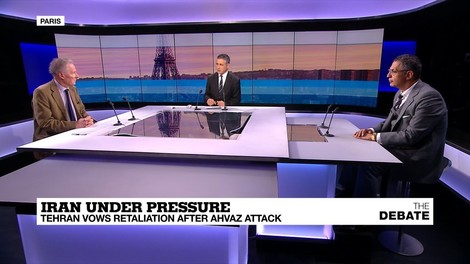Your podcast discovery platform
Curious minds select the most fascinating podcasts from around the world. Discover hand-piqd audio recommendations on your favorite topics.

piqer for: Climate and Environment Globalization and politics Health and Sanity
Mona Silavi is a human and women’s rights activist from the Ahwaz region in Iran. She obtained her bachelor in psychology and specialized in children and adolescence psychology at Damascus University, faculty of psychology and education. She holds a master degree in good governance and human rights in MENA region from Ca’ Foscari University in Venice. She started her activism in Damascus as member of Ahwazi Arab student association. Mona Silavi is a Project Officer at the Unrepresented Nations and Peoples Organization (UNPO) and is the coordinator for topics concerning freedom of religion and belief. She is also a spokesperson of the Al-Ahwaz Democratic Solidarity Party (DSPA). Since 2014 Ms Silavi lives in Belgium as a political refugee
Video: The Ahwazi Arab Minority In Iran And The Implications Of The Ahvaz Military Attack
The city of Ahvaz is situated in the province of Khuzestan, an area rich in oil resources, situated in the south-west of Iran, an area the local Ahwazi Arab residents of the region call “Al-Ahwaz”.
Ahwazi Arabs form an ethno-linguistic minority in Iran, and their region is the backbone of Iran's economy, yet the local population lives in abject poverty. Ahwazi Arabs, along with other ethnic minorities, have legitimate grievances as they are subjected to systematic discrimination.
On 22 September, concurrent with the anniversary of the beginning of the Iran-Iraq war, a parade of the Islamic Revolutionary Guard Corps (IRGC) was attacked by anonymous gunmen.
Only hours after the attack, an Ahwazi separatist group claimed that the attack was carried out by a national resistance group inside Ahvaz. The Iranian government accused Israel and Saudi Arabia of supporting Ahwazi groups to destabilise Iran. And shortly after, a mass arrest campaign against Ahwazi Arab civil activists was started. According to local human rights organizations, some 300 people were arrested. However, later and following a video published by ISIS, the finger was pointed at the infamous terrorist group.
Iran promised to take harsh revenge on those responsible for the attack. The threat by the Islamic Republic of Iran was actualised by 6 missiles that were fired into Syria today.
The majority of Ahwazi Arabs are Shia and ISIS does not have supporters among this community. The Ahwazi question in Iran has always been the question of national rights and demands and has never been a sectarian problem with the central government. Historically, minorities have always been the scapegoats for the state, and Ahwazi Arabs in Iran are no exception.
In this debate on France 24, you can hear the opinion of experts about the situation of Ahwazi Arabs, the power relations between Arabs in Iran and the central government, and the implications of this attack on this national minority.
